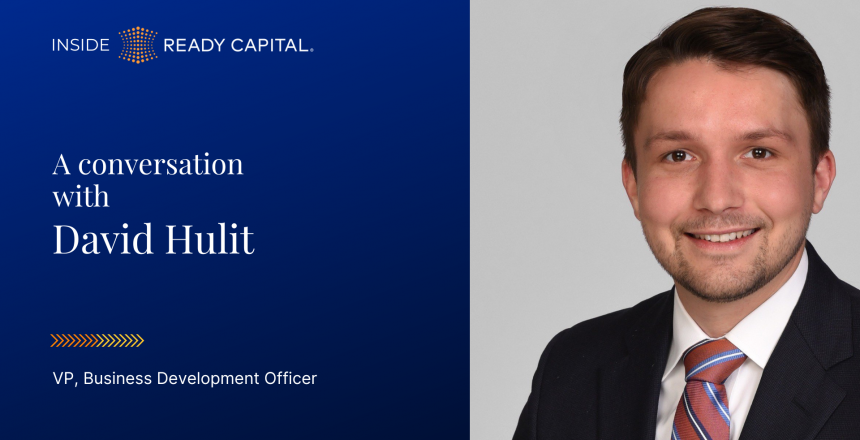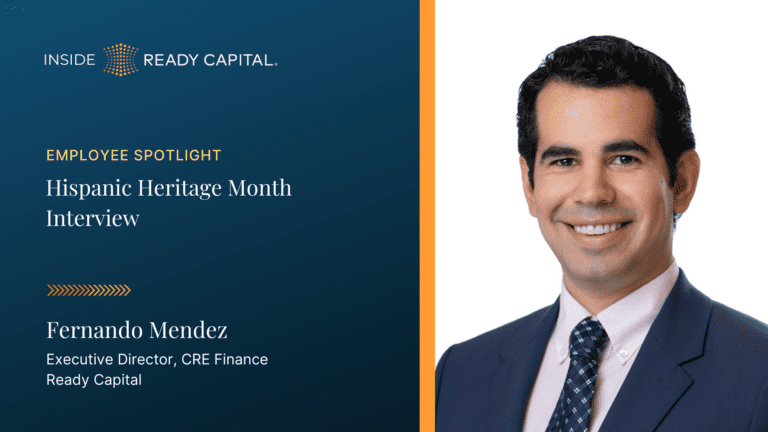David, what got you interested in small business lending?
I had the privilege and the fortune of being born into a banking family. I grew up with my mother being a commercial lender and seeing the opportunity that that gave our family. One of the things I loved about it was driving around Maine, which is a small state, and – it’s kind of a common and funny thing — it’s almost one degree of separation. Everybody knows somebody, and so we’d drive around and there would be a lumber company or a restaurant and my mom would say “Oh, they’re one of my clients.” I always liked that and feeling part of the community in that regard.
My stepdad is also a small business owner, owns a restaurant, and I’ve seen through that lens the struggle to get financing and what can be accomplished once that financing is accessible. He was able to grow a business, provide jobs for people who are friends of mine… I worked at his restaurant as a server for a while. So I saw a direct benefit from these lending programs from the employee’s side.
If you weren’t busy being a Business Development Officer (BDO), what would you be doing?
I always wanted to be an entrepreneur, and I think this is the closest my risk appetite enables me to get to. I feel like being a BDO is like being an entrepreneur with training wheels in the sense that I’m very grateful to have a salary, but it is a business that I’m able to scale and develop. And there are many different strategies to do that. I get to live out a little bit of my dream of starting my own small business by helping others start theirs.

There are wonderful banks out there that people know and trust. What is the unique value that a non-bank lender can provide?
I have a deep respect for community banks – especially in Maine. We’re a very well-banked state which is good for the consumer. I also know from experience and from talking to entrepreneurs that there is a missing component of available collateral for certain types of businesses, and non-bank lenders are able to fill that void.
Community banks have their place in the market, but there are things that without an SBA guaranty they are uncomfortable, unable, or unwilling to do. But they’re still good credits, they’re still good risks and opportunities. And that’s what the SBA program is there for: it’s to provide that guarantee to the lender, to fill that void, and to protect borrowers from going further down the alternative capital elevator which can have very unreasonable terms.
Being a non-bank lender at Ready Capital, we can be a little bit more creative. We don’t have a black-and-white approach to lending. We listen to the story and we work through challenges that other good-intentioned lenders may decide to walk away from. We look at the whole picture and we find ways to mitigate risk with the other inherent strengths of the deal.
Can you tell us a little bit about your mindset as a BDO?
From a service perspective, I view banking through the true lens of its financial services. It’s the financial underlying services industry. When many small business borrowers come to Ready Capital, they share that they feel they are not being treated compassionately. They are not being given a concierge or fine dining level of service. And they’re frustrated. Lenders are not anticipating the borrower’s wants and needs nor taking the time to understand their story. They lack an empathetic, service-level approach.
The nature of SBA lending is that we are not the borrowers’ first stop, and I believe that we shouldn’t be their first stop. The intention of the SBA loan program is that borrowers cannot receive credit elsewhere on reasonable terms. That’s why they need an SBA loan. When they get to me, I find it very important to provide the highest level of service. This is the largest debt obligation most of these entrepreneurs will ever make in their life. Their deals should be treated with that level of attention, detail, and respect.
What attracted you to the opportunity at Ready Capital?
Ready Capital has a great reputation in the SBA market. I worked for another non-bank lender and then another SBA bank lender, and I always admired the team at Ready Capital. I saw the BDOs on LinkedIn, enjoying their career. It set a very high bar for quality but also culture. It seemed like a great place to be and work and now having been here for two years and eight months, that’s only been validated.
We also have the best credit team that there is. The way they look at deals and the way they look at both internal and external partners is from a place of respect and problem solving. They’re looking for reasons to make a deal work; they’re not looking for reasons to say no.
That’s true throughout the process here. It’s a very creative, entrepreneurial group of people.
There are very open lines of communication which I find is unique to Ready Capital. There are no silos here. If we need to talk to Chief Credit Officer or CEO, that can be arranged within the same day. There is a culture of everybody has the opportunity to collaborate – even at the highest level.
I find it very important to provide the highest level of service. This is the largest debt obligation most of these entrepreneurs will ever make in their life. Their deals should be treated with that level of attention, detail, and respect.
– David Hulit, VP, Business Development Officer, Ready Capital
Is there an SBA deal you feel particularly proud of?
I’m very proud of the approach our team took with this deal: We had a loan request from an individual who had, 40 years ago (the 1980s) had lived a different life and was impacted by the judicial system. The SBA process is very specific and labor-intensive for clearing past convictions. Our team has worked overtime, and with respect and empathy – everyone from the CEO to In-house Legal Counsel to Chief Credit Officer, Head of Sales – to lend a hand in navigating this challenging circumstance. It’s great to see that.
These are sensitive subjects for a lot of people who’ve overcome adversity and turned their lives around. The requirements of the government loan program require lenders to follow certain stipulations. And though that can be delivered in many different manners, we’ve been delivering it from a service-level perspective, leading with both our hearts and minds to get the deal done.
Read the full loan story of Booker’s Restaurant & Bar
Another client of mine served five years. During their time in prison, they learned from their mistakes and managed to turn it into something beautiful. From prison, they learned dentistry. After leaving, they started his own dental practice and a non-profit providing free dental work for the homeless. They’re a small business owner providing jobs in the field. It’s a true turnaround story. That’s one of the most amazing benefits of the SBA loan program. A lot of times banks can get stuck in the numbers and quickly walk away. The SBA allows lenders to dig into these stories and work with people. The true credit goes to the individual who took a bad situation and made it better. I’m just so happy to be able to work with a lending institution that believes people deserve a second shot.
At Ready Capital, we like to debunk small business lending myths. Are there borrowers or brokers who are self-disqualifying who shouldn’t be?
There are five Cs of Credit. Often lenders are so focused on collateral, capacity/cash flow. One of the Cs is character. A lot of borrowers will self-disqualify due to credit score. You go to apply for a home loan and a credit score of 650 might be too low. But it isn’t too low for an SBA loan. The SBA does not have a minimum credit score requirement. That’s a big misconception. Whether it’s a misconception that’s perpetuated by YouTube influencers or bankers that are foisting blame on the SBA as a third party or whatnot… the credit score is up to the individual lender. If there are other strengths to the deal – the other four Cs – the deal can be accomplished. At Ready Capital, we’ve closed deals with credit scores as low as 600.
Here’s an example: We had a plumber who was buying the plumbing business he worked at. He had all the experience in the world. The loan had no hard collateral, no commercial or residential real estate. There were some business assets but not enough to secure the loan. The plumber was turned down by multiple lenders because he had a 620 credit score.
The cash flow and capacity of the business was immense. Experience was immense. We believed in the borrower. When we looked into the story of why his credit score was low, we saw that he was paying his mother’s bills when she was sick instead of his own bills for a one-and-a-half-year period, making him late on his payments. It wasn’t because he was a habitual late payer of credit. He was doing the right thing to help his mom, but it affected his credit.
Other lenders were unwilling to hear that story or to even look at the credit report to be able to assess that trend of repayment ability. They saw the number and they said no. Ready Capital, we took the extra steps and effort to learn and to weigh all the metrics.
Another thing some borrowers assume they need is collateral such as real estate – especially if your credit score is lower. That’s not a hard requirement.
And in some instances, cash flow. A lot of borrowers think they need three years for strong debt service coverage (DSCR). But the SBA is also there for growing businesses. We understand that a business may have been in a ramp-up period. And a projections-based loan is necessary and prudent because the business was investing in growing and now that they’re taking off, they need capital to help continue their business expansion. That is where conventional lenders get very, very hesitant, and that the SBA loan program is very powerful to help a growing business. We see a lot of business self-select out on that basis as well.
How can small business lenders help?
I love a good email with a loan package, but sometimes, a 15-minute call can help flip all the stones over and address any myths head-on. We’re here to listen and to problem solve. We’re not here to say no.
As a lender myself, I need to continuously project that I am not a goalie; I’m a coach. Obviously, we can’t do every loan. If a loan can’t be done today, I can provide feedback today on why and what we would need to see to do the loan in the future. I take a consultative approach. And if it can’t be done at Ready Capital, maybe another lender can. Lenders have strengths and weaknesses just like the borrowers do.
Now is a good time for borrowers to make sure their financial team is on the same page. with their CPAs, brokers, financial advisors to set their expectations and goals for 2023. Communication, early and often, helps everyone do the best together to execute on plans efficiently and with the highest rate of success. Everything starts there.
Some good questions to ask if your goal is to get an SBA loan:
- Will loan require additional collateral?
- Will the loan require a down payment. If so, what amount?
- If you have a prior felony that needs to be cleared, plan on getting that process started immediately.
Borrowers and advisors should set their plan based on informed feedback from the lender on the other side of the table. Sometimes a lender says “This doesn’t cash flow the way that we need it to.” That can be eye-opening to the borrower. But that’s valuable feedback on their journey.
I’ve seen borrowers take our outlined “hurdles” and do the necessary work of paying down debt, bringing on a different or additional guarantor… even one year later, after a successful year and tax filing, come back and cleared those hurdles up.
Any tools or resources you would recommend to help future owners prepare for a conversation with you?
Yes, here are two free, excellent resources from the SBA:
- SCORE Counselors (SBA free resource) – Former or current entrepreneurs who know how to put read a Profit & Loss statement (P&L), put together projections, understand gross margin, net margin, opportunity, etc.
- SBDC – Learn how to create a business plan, set up projections and other materials.
Also, our referral partners – Financial advisors, loan brokers, etc. understand the SBA loan process and can help you craft your materials.
You’ve achieved a lot already in your career. Do you have any goals for 2023 and beyond?
My goal is to help more small business owners. In particular, I want to do everything I can to advocate for growth in the loan program around the criminal conviction documentation process so that we can provide more equitable access to affected peoples of the prison and judicial system.
Learn more about SBA Lending at Ready Capital reach out to David for projection templates, business plan templates, personal financial statements which he can share with you early on so you can understand what it’s going to take to get your deal done.
Inside Ready Capital is a Q&A series with Ready Capital employees that amplifies thought leadership and other unique perspectives.






